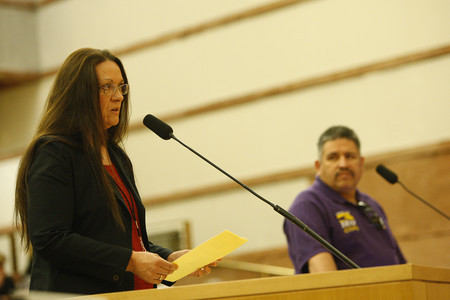Homeless services get ax
A rigid budgetary cap and a union contract hamstrung Clark County commissioners who wanted to keep $7 million in social programs.
Commissioners voted 5-2 on Tuesday to slash a chunk of nonmedical services for the homeless and destitute after county staff said the cuts must be made to prevent social services funding from running out by November.
"I think this is a difficult decision, but I think we have to make it," Commissioner Rory Reid said.
Commissioners Chris Giunchigliani and Lawrence Weekly voted to hold off on the cuts for at least two weeks.
Reid argued that postponing action for two weeks would only delay the inevitable.
Both Weekly and Giunchigliani pushed for finding some way to reopen the social services office at the Fertitta Community Assistance Center that aided the homeless.
"We need to stop sitting here and talking and playing games with people's lives," Weekly said.
Commissioners learned that the labor contract makes it difficult to restore the Fertitta office.
Clark County Director of Social Service Nancy McLane said the employees who ran the office were among the 31 part-time workers the agency recently laid off.
Because the agency is preparing to lay off full-time union employees, it can't re-hire any of the part-time workers, McLane said. The labor contract requires all part-time jobs to be eliminated before full-time workers are laid off.
Commissioner Tom Collins noted that the county has no part-time union employees.
The contract is designed to prevent the county from replacing full-time workers with part-time help, said Al Martinez, president of the Service Employees International Union Local 1107.
Martinez contends that the problem is not part-time versus full-time jobs.
"It's a funding issue," he said.
Mary Ann Miller, the county counsel, said that a statutory funding cap bars the county from spending any more tax money on certain social programs.
The cap is tied to the local property tax rate. When the state grabbed 4 cents from the tax rate, it not only took $9.3 million from social services, it also lowered the cap.
Ignoring the cap could open the county to lawsuits and county leaders to charges of malfeasance, Miller said. "The statutory cap is absolute."
But Giunchigliani said two members of the Legislative Counsel Bureau told her that there are actually three local funding caps and that the county could work around one of them.
In the end, most commissioners didn't want to risk flouting the law.
"I think the consequences of ignoring it are significant," Reid said. "We have an opinion by our attorney."
But the commissioners agreed to remain open to any legal solutions the bureau might find.
They also agreed to look for money to replace the $2.4 million the county will lose for elderly services, given that those funds are not subject to the cap.
And the county will explore how it can restore, at least partially, the Fertitta office, perhaps by using full-time employees.
One bright spot was the roughly $1 million in federal reimbursements that could go toward programs affected by the funding cap.
McLane also said that by saving elderly services, the agency would cut its full-time staffing by 11 percent instead of 23 percent.
But if the county were to delay cutbacks, the agency's money would dwindle, leading to more layoffs, she said.
Commissioner Larry Brown said the board must get used to making unpleasant choices.
"Every two weeks there are going to be decisions of this magnitude," Brown said.
Contact reporter Scott Wyland at swyland@reviewjournal.com or 702-455-4519.


















